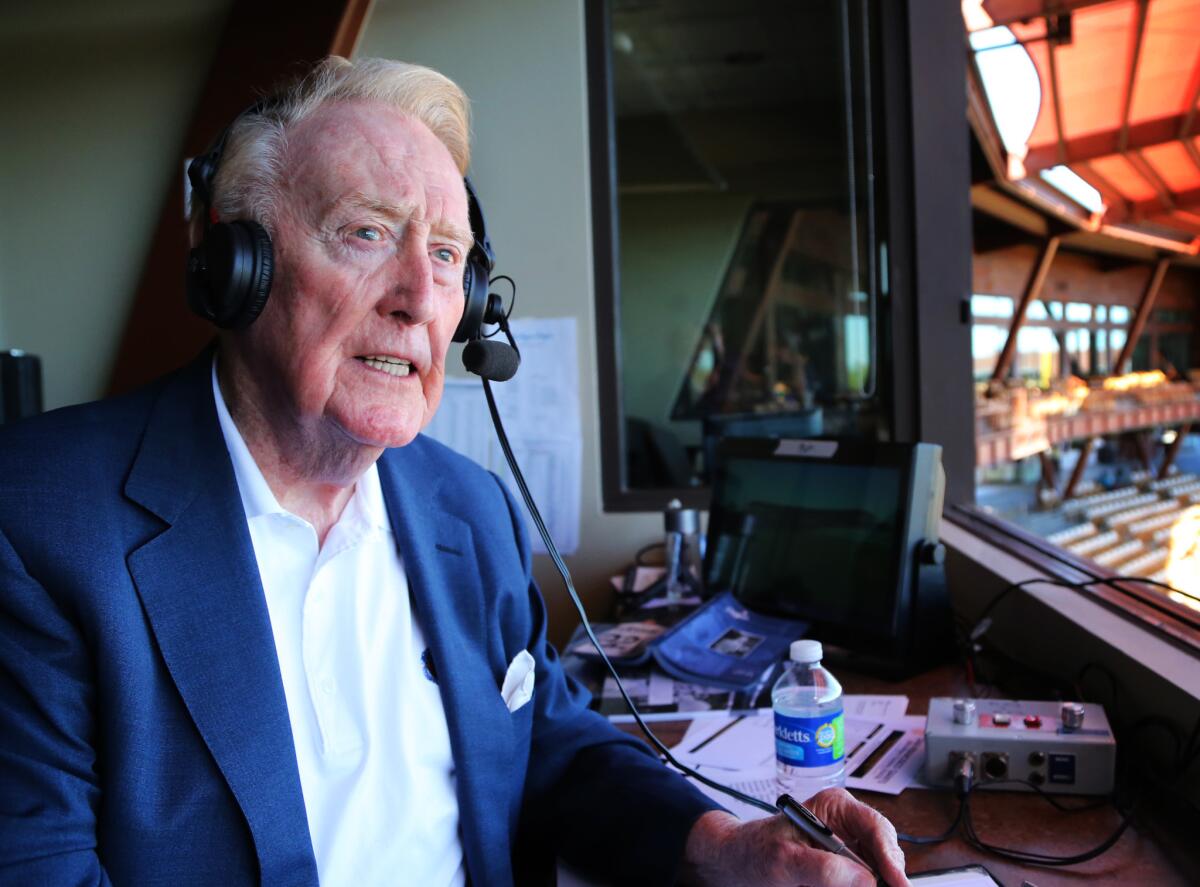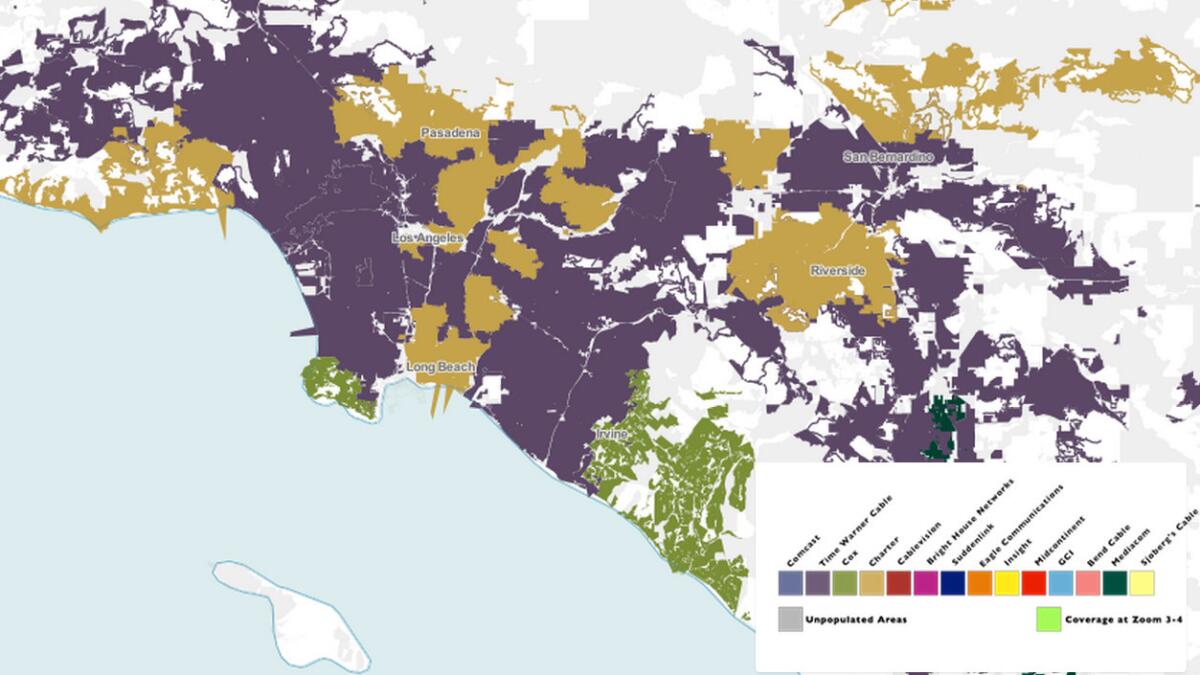Time Warner Cable and the Dodgers finally discover the limits of greed

- Share via
When last I addressed the extended debacle that pitted Time Warner Cable and the Los Angeles Dodgers against the interests of the Dodgers' fans, it was to point out that this was a teachable event: It reminded the fans that when money is at stake, "the teams are businesses that don't give a Tinker-to-Evers-to-Chance's damn about them."
That could help inoculate the public against "the virus of gimme that pro sports teams spread in their local communities," I observed. "The owners and their leagues demand tax abatements, public stadium funding, and all sorts of other handouts because, you know, they truly belong to the people."
If nothing else, let's do it for Vin Scully.
— -Los Angeles Mayor Eric Garcetti stretches credulity
That was in February 2015, when the blackout keeping Dodgers telecasts from millions of homes across the Southland was about to enter its second ridiculous year. At the time, it was unimaginable that the obdurate greed of the team or its broadcast rights holder, Time Warner Cable, would continue for another season. It did, and the standoff is about to enter Season 3.
As my colleagues Meg James and Ryan Faughnder have reported, the cable company recently offered to drop the price of its Dodgers cable channel in an effort to win space on Cox Communications' cable system and DirecTV's satellite service, the major holdouts. The offer failed, and Time Warner now appears to have abandoned the effort.
A couple of points about all this. First, a quick look at the economics that brought us to this pass.
In 2013, the Dodgers' new owners, led by Guggenheim Partners, reached a deal with Time Warner Cable to create a Dodgers cable channel called SportsNet LA to be carried by Time Warner Cable. TWC agreed to pay $8.35 billion over the life of the 25-year deal for TV rights to Dodgers games. This represented some very rosy-tinted analysis by TWC, which figured it could get much of that back by hawking the channel to the other pay-TV outlets in the region.

But Time Warner demanded such a high price for the channel that it received a firm "no" from every other pay-TV system, which included Cox, Charter Communications, the fiber services Verizon FiOS and AT&T U-verse, and the satellite companies DirecTV and Dish. Time Warner Cable served only about 30% of the pay-TV households in the Southland, so Dodger games were effectively blacked out for the other 70%.
As I wrote in 2014, "the magic of the free market was trumped by the black magic of greed. The Dodgers held out for the highest price they could get for the TV rights, figuring the team is such a jewel in the Southern California sports crown that the sky was the limit. Time Warner figured it could squeeze the other pay-TV companies for every last dime because, really, what TV service would dare not carry the Dodgers, whatever the price? The answer was: all of them."
(Since then, Charter, which is poised to take over Time Warner Cable, has added the Dodger channel to its lineup. AT&T acquired DirecTV last year.)
Another point is that this showdown has prompted some of the most spectacularly hypocritical corporate pronouncements known to human history. In 2014, when the Dodgers stretched the National League pennant race into the last week of the season, TWC decided to put the last six games of the season on free TV, and then swanked around as though it was the fans' savior.
"We're Dodger fans too," a company mouthpiece said. "Angelenos love their Dodgers, and we’re happy to give them a way to watch their beloved team during this pennant chase."
Of course, Time Warner Cable wasn't part of this community then and isn't now. It's a New York corporation that sees Los Angeles as just another market to be squeezed until it screams for mercy. Time Warner Cable's people aren't "Dodger fans"; they're executives feeding their bottom line, and in this case they found themselves choking on the meal.
But that pales next to the more recent statements of Time Warner Cable shills. The most shameless development is their invoking the sainted name of Dodgers broadcaster Vin Scully, 88, who will retire after this season.
"The Dodgers' massive fan base deserves to be able to watch Dodger games regardless of their choice of provider," Major League Baseball Commissioner Rob Manfred said, in urging the TV holdouts to accept Time Warner's "significant economic move." He added, "The situation is particularly acute given that this is Hall of Fame broadcaster Vin Scully's final season."
Spare us, Commissioner. You want the team's massive fan base to see the games? Spend some of MLB's money to put the Dodger Channel on DirecTV. If you're not willing to step up to the plate, keep your mouth shut.
L.A. Mayor Eric Garcetti, who really should know better, also got into the fray, stating that he's "hopeful that we are close to breaking the deadlock and finally doing the right thing for Dodger fans. If nothing else, let's do it for Vin Scully." It's unclear who the "we" is in that statement, since this is a dispute among a bunch of corporate behemoths, not a civic project.
For what it's worth, Scully said he found being drawn into the corporate bickering "really kind of embarrassing for me." One more black mark on the Dodgers/Time Warner Cable roster of shame. Scully also said, in a conversation with my colleague Bill Shaikin, that if mentioning his name would "serve in any possible way to get the fans to see more games, that is the thing I would be rooting for."
From the standpoint of Time Warner Cable and the Dodgers, the worst aspect of this fiasco must be that it shows how wildly they overestimated the team's value in the Southern California market. TWC originally offered the Dodgers to its pay-TV rivals for $4.90 a month per subscriber home, whether the subscribers wanted the channel or not; a counter-offer from DirecTV to make the channel a paid add-on just for households that wanted it was spurned by TWC.
In March, the increasingly desperate TWC cut its asking price by nearly 30%, to $3.50 per home. That's less than some other regional sports networks command, including New York's YES Network, which carries Yankee games and costs its cable carriers more than $5 a month per subscriber. TWC's offer, however, was for only one year, after which it would be subject to renegotiation. Unsurprisingly, DirecTV and the other systems spurned the offer: They weren't so dumb they didn't recognize that it would give TWC tremendous leverage, since giving subscribers a channel and then taking it away is a lot harder than never offering it in the first place.
More recently, James reports, Time Warner Cable proposed a six-year deal for about $3.84 a month, about what DirecTV charges for a regional sports channel it owns in Seattle. TWC says that's been rejected, too.
What's left? The ball soon will be in Charter's pitching hand. It may have to cut the price of Dodger telecasts even more, and eat whatever losses that means. But the one thing it needn't bother to do is tell the fans, whatever the ultimate deal, that it's doing it because it loves them. They've heard it before.
Keep up to date with Michael Hiltzik. Follow @hiltzikm on Twitter, see his Facebook page, or email michael.hiltzik@latimes.com.
Return to Michael Hiltzik's blog.
UPDATES:
6:13 p.m.: This item has been updated with additional remarks by Vin Scully and Mayor Garcetti.
